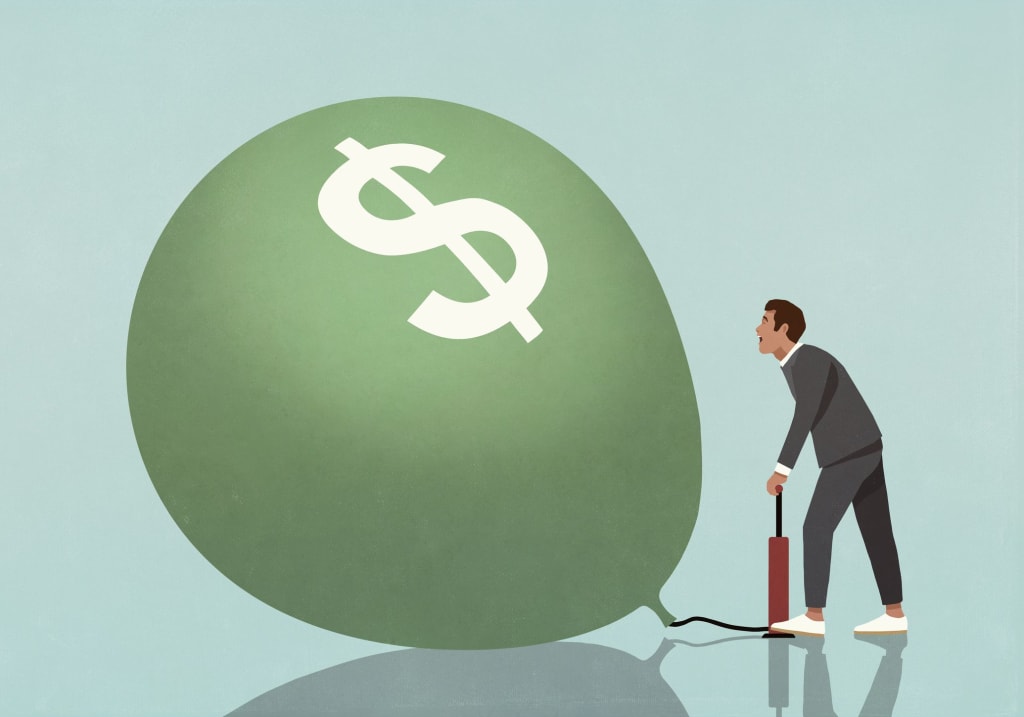The Impact of Inflation on the Economy and Your Investments
Inflation is an economic concept that refers to the general rise in the prices of goods and services over time. It is a common phenomenon that affects economies worldwide, and its impact can be felt in various aspects of life, including investments.

Inflation is an economic concept that refers to the general rise in the prices of goods and services over time. It is a common phenomenon that affects economies worldwide, and its impact can be felt in various aspects of life, including investments. In this article, we will discuss the impact of inflation on the economy and your investments.
Understanding Inflation
Inflation occurs when the demand for goods and services outstrips the available supply, leading to an increase in their prices. It is measured using an inflation rate, which is the percentage change in the price level of a basket of goods and services over a specific period. Inflation can be caused by various factors, such as increased demand, a decrease in supply, or an increase in production costs.
The Impact of Inflation on the Economy
Inflation can have a significant impact on the economy in several ways. One of the most notable effects is the reduction in the purchasing power of money. As prices of goods and services rise, the same amount of money can buy fewer items, reducing the standard of living for consumers.
Inflation can also lead to an increase in interest rates. When inflation rises, the central bank may increase interest rates to curb it. Higher interest rates can discourage borrowing and spending, which can slow down economic growth.
Another impact of inflation is the decrease in the value of savings. If the inflation rate exceeds the interest rate earned on savings, the real value of savings will decrease over time. This means that the same amount of money saved will have less purchasing power in the future.
The Impact of Inflation on Your Investments
Most people understand that inflation increases the price of their groceries or decreases the value of the dollar in their wallet. In reality, though, inflation affects all areas of the economy — and over time, it can take a bite out of your investment returns. Inflation can also have a significant impact on your investments. This impact can be positive or negative, depending on the type of investment.
1. Stocks
Inflation can be positive for stocks because it can lead to higher revenues and profits for companies. This is because companies can increase their prices to match the rise in costs, leading to higher profit margins. However, high inflation can also lead to higher interest rates, which can decrease the present value of future earnings and lead to a decrease in stock prices.
2. Bonds
Inflation can be negative for bonds because it can reduce the real value of the bond's future cash flow. This means that the fixed interest payments received on the bond may not keep up with the rise in prices, leading to a decrease in the real value of the bond's cash flow. As a result, bond prices may decrease.
3. Real Estate
Inflation can be positive for real estate because it can lead to an increase in the value of the property. This is because higher prices for goods and services lead to higher rents and property values. However, high inflation can also lead to higher interest rates, which can increase the cost of borrowing and reduce demand for real estate.
4. Commodities
Inflation can be positive for commodities because it can increase demand for raw materials and natural resources. This can lead to an increase in the price of commodities, which can benefit commodity investors.
Tips for Protecting Your Investments Against Inflation
Inflation is a significant risk for investors, and it is essential to take steps to protect your investments against it. Here are some tips for protecting your investments against inflation:
1. Invest in stocks: Stocks have historically provided a hedge against inflation, as they can benefit from rising prices and increased revenues.
2. Invest in real estate: Real estate can also provide a hedge against inflation, as it can benefit from higher rents and property values.
3. Invest in commodities: Investing in commodities, such as gold or oil, can also provide a hedge against inflation, as they can benefit from increased demand and higher prices.
4. Invest in Treasury Inflation-Protected Securities (TIPS): TIPS are government-issued bonds that are designed to protect against inflation. The principal value of TIPS is adjusted for inflation, which means that the interest payments and the final payment at maturity will be based on the adjusted principal value.
5. Invest in high-yield bonds: High-yield bonds, also known as "junk bonds," can provide a hedge against inflation, as they typically offer higher yields to compensate for the increased risk of default.
6. Diversify your portfolio: Diversification is critical to protecting your investments against inflation. By spreading your investments across different asset classes, you can reduce the impact of inflation on any one asset.
Conclusion
Inflation is a common economic phenomenon that can significantly impact the economy and your investments. By understanding the impact of inflation on different asset classes, you can take steps to protect your investments against inflation. Investing in stocks, real estate, commodities, TIPS, high-yield bonds, and diversifying your portfolio can all help you protect your investments from the effects of inflation. Remember, it's important to stay informed about economic trends and to consult with a financial advisor before making any investment decisions.
About the Creator
VIVEK SINGH
Audience-oriented Content Creator | | Engineer, Trader & Investor | | Tech, Finance, Business, and Online Marketing | |






Comments
There are no comments for this story
Be the first to respond and start the conversation.